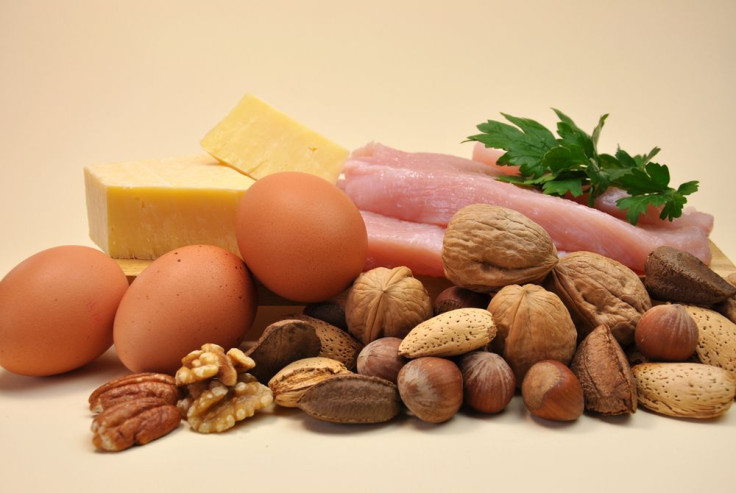Meatless Protein: 7 Great Sources Of Protein Other Than Meat

Protein is often associated with weight-lifting and building lean muscle, but a diet high in protein can also help us maintain a healthy weight, build and repair muscle tissue, and curb our appetite. Along with fat and carbohydrates, protein is considered a macronutrient which means we have to consume large amounts to stay healthy. According to the USDA’s Recommended Dietary Allowances (RDA), we should take in between 10 to 35 percent of our daily calories from protein sources. Now, if you think the only way you can up your protein intake is by eating more steak and chicken, there are more protein sources in your diet other than meat.
1. Eggs
Not only are eggs an incredible source of protein, but they also contain several B vitamins responsible for energy, including B6, B12, thiamin, riboflavin, and folate. A single hard-boiled egg with the yolk will provide you with 6 grams (g) of protein alone. The all-natural, high-quality protein found in eggs is often used as the benchmark for evaluating the protein quality of other foods. Although it is true that eggs are high in cholesterol, they are only high in HDL “good” cholesterol and do not have an unhealthy impact on our cholesterol levels.
2. Cottage Cheese
With 13g of protein for every 4 ounces (1/2-cup), cottage cheese is an essential component of every gym rat's diet. For those of you who don’t find the taste of cottage cheese to be all that appealing, try adding nuts, fruit, and cinnamon for some flavor, antioxidants, fiber, and more protein. As a dairy product, cottage cheese also builds up bone strength through its high amount of calcium. For optimal muscle recovery nutrition, consider cottage cheese for your midnight snack due to its casein protein content. Casein protein is a “slow acting” protein as opposed to whey protein, which is “fast acting.” Consuming casein protein before going to sleep, when you are unable to consume protein for obvious reasons, will ensure a steady flow of protein when your muscles are already in recovery mode.
3. Greek Yogurt
Whether it’s first thing in the morning, a midday snack, or right after an intense workout, a container of popular plain Greek yogurt brands, including Fage, Oikos, and Chobani, can provide you with upward of 20g of protein. While Greek yogurt is packed with almost double the amount of protein as regular yogurt, it also contains fewer carbohydrates, which is why it is a favorite among diabetics. Greek yogurt is also recommended as a substitute for other dairy products such as sour cream, cheese, and ice cream thanks to its low-fat content. You can also make your tuna or chicken salad healthier by substituting mayonnaise for Greek yogurt.
4. Nuts
The best part about adding nuts to your diet as a healthy protein source is the amount of variety you have. Almonds, pistachios, walnuts, peanuts, and cashews are packed with all three macronutrients on top of essential micronutrients such as vitamin E, vitamin B6, magnesium, phosphorus, zinc, and potassium. The protein count for each type of nut includes 5.9g for 22 unsalted almonds, 5.9g for 49 unsalted pistachios, 4.3g for 14 walnut halves, 6.7g for 35 unsalted peanuts, and 4.3g for 18 cashew halves.
5. Chia Seeds
Something as small as a chia seed may seem like an odd source of protein, but this tiny superfood is packed with omega-3 fatty acids, fiber, antioxidants, and, of course, protein. An ounce of chia seeds contains 4g of high quality protein, 12g of carbohydrates (11 of which are fiber), and 9g of fat (5 of which are Omega-3s). Many nutrition and fitness experts recommend chia seeds as a substitute for energy drinks and carbohydrates as a pre-workout supplement.
6. Beans
Vegetarians rely on beans as a major source of protein for their meatless diet, and for good reason. Similar to nuts, protein can be found in a variety of different bean choices, including soybeans (28.5g of protein per cup), kidney beans (15g of protein per cup), black beans (15g of protein per cup), pinto beans (15.5g of protein per cup), and lima beans (14.5g of protein per cup). The variety of different bean options can also be added to a variety of different meal options, including omelets, salads, chili, and other popular dishes.
7. Quinoa
In addition to beans, the superfood quinoa is a recommended protein source for people on a vegetarian diet. A single cup of quinoa is packed with around 24g of protein. It is also considered a complete protein, which means it contains all nine essential amino acids that have to come from food, since they are not naturally produced by the body. Recognizing the nutritious qualities of this whole grain, the Food and Agriculture Organization of the United Nations (FAO) declared 2013 “The International Year of the Quinoa.”



























